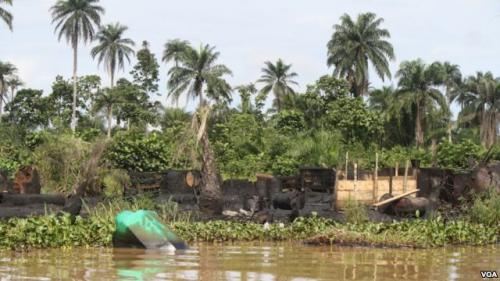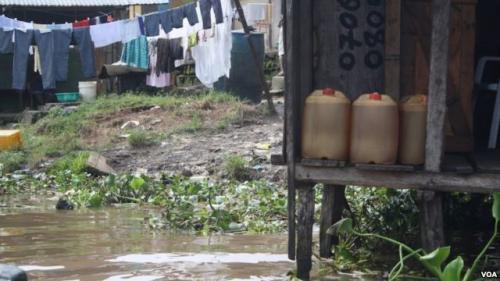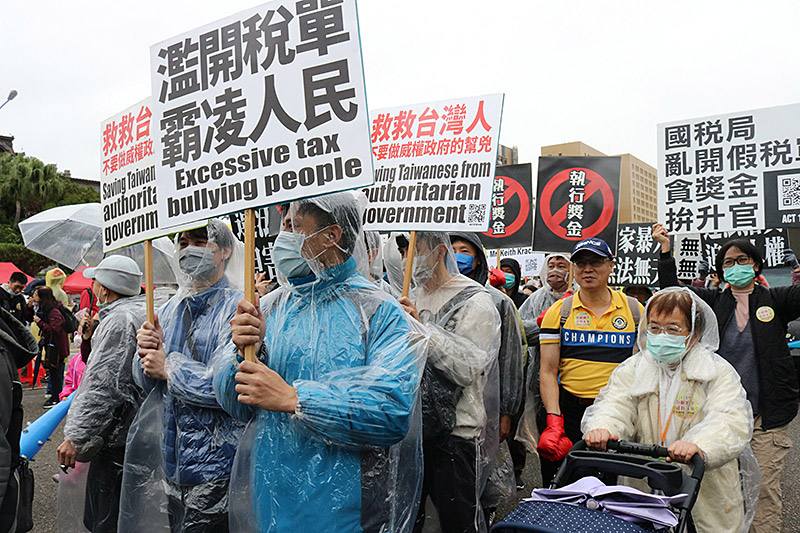In Niger Delta, Black-Market Oil Booms
Over the past five months, Nigerian security services have torched more than 900 illegal oil refineries in the country's coastal areas, but locals say business hasn't stopped.

Nigerian security forces say they have burned more than 900 illegal refineries to the ground in the past five months, but oil companies continue to complain that theft is crippling their profits.
While oil companies and the government complain they are losing more than $1 billion a month in proceeds from stolen oil, workers at the illegal refineries say the oil belongs to all Nigerians and that, for many, it is the only way to make a living.
It started years ago when a Niger Delta palm-wine maker figured out how to apply his techniques to a more profitable enterprise: refining small amounts of Nigeria’s vast stores of crude oil in barrels over wood fires.
Obtaining stolen oil with the help of his local "boys" - former Niger Delta militants who gave up their weapons and returned home on the promise of jobs which never materialized - over the years his secret was shared with friends.
Although militants have ceased fighting in Niger Delta waterways over the past two years, the underground market for stolen oil has boomed. Illegal bunkering - oil theft and its illicit refinement, sale and distribution - has turned some rivers and creeks into virtual black-market oil and fuel highways.

In Niger Delta cities like Warri fuel is sold in jerry cans from illegal refineires and often resold several times before it is used.
A dirty job
Along one river in the Niger Delta, small streams of smoke rise from burned-out artisanal refineries. Women and children paddle dugout canoes packed with jerry cans of fuel to sell in the markets, and teenage boys guide large corroding wooden boats - presumably laden with stolen crude - toward the refineries.
One man operating a small refinery on the riverside gets upset when asked where the oil comes from. If the government provided jobs, he says, men like himself wouldn't be in the oil trade at all.
"We just call it offense, [but] there is no offense. If the federal government put companies here, you [would] not see anybody do this job," he says. "It’s a dirty job anyway."
Everyone in the community, he says, gets a cut of the profits, and most people have no other options. Even local law enforcement is in on the game, he explains, taking their cut and looking the other way.
'Operation Pulo Shield'
Lieutenant Colonel Onyema Nwachukwu, spokesperson for Nigeria’s Joint Task Force, or JTF, in the Niger Delta, says only people who want security forces such as JTF to fail are willing to accuse task force agents of profiting from the industry.
"I believe that those that making such insinuations are detractors of the JTF," he says. "There are those that are outraged by the exploits and successes of our operations, and when we deal a blow to those illicit activities they react."
In January, the JTF shifted its focus from fighting militants to protecting oil, he says. With peace largely restored, the JTF even renamed its mission, calling it "Operation Pulo Shield" ("pulo" means "oil" in the local Ijaw language).
“The new focus is to combat illegal bunkering, illegal refineries, pipeline vandalism and other sundry crimes bedeviling Nigeria’s oil and gas sectors," he says.
National economic impact
According to Indutimi Komonibo, special advisor on oil and gas to the governor of Bayelsa State, in a country where most national budget revenues and nearly all foreign currency come from oil exports, the stakes couldn’t be higher.
“The nation is losing a lot of crude to oil theft perhaps because of negligence, or perhaps [because] our youths don’t have anything to do, or perhaps the oil companies also need to be blamed," he says.
The Niger Delta is also reeling from oil spills. In fishing communities, residents say business has flatlined, their children are sick and there is no help in sight.
Oil companies and the Nigerian government, however, say illegal bunkering and refineries are responsible for more than half of the spills, complicating efforts to hold the companies responsible for cleanups.
Along one oily riverbank, a local man in tall rubber boots says his family has never received help cleaning up oil that soaks the leaves and kills the fish. He doesn't look for help, he explains, because his refinery is illegal.
Like others in the Niger Delta, he says denying Nigerians access to their resources is an injustice.
“They should make these local refineries to be legal, because they’re the life of these people," he said. "You know people who are involved with these things? In the whole Niger Delta? I can say half of it is involved.”
When asked where he gets his crude oil, he just laughs.
“It’s something we find in our soil,” he says.
Source: Voice of America
- 425 reads




